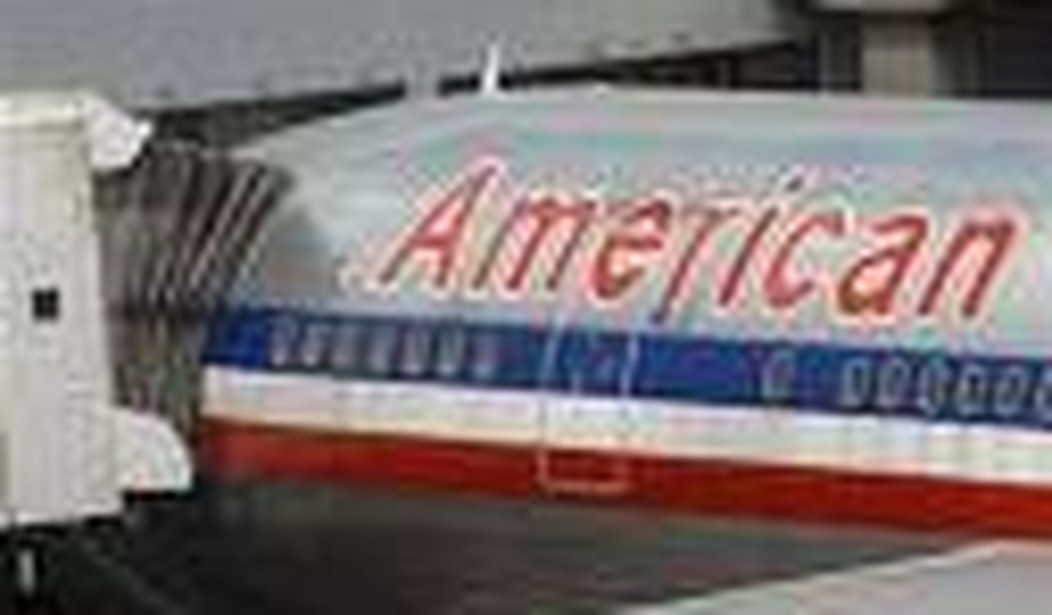Six Iraqi natives announced in Detroit last week that they are suing American Airlines for “hundreds of thousands of dollars” because they were racially profiled, leaving at least one of the six feeling “violated.” Putting aside the inaccurate charge-racial profiling is defined as the practice of substituting skin color for evidence as grounds for suspicion by law enforcement officials; the men’s skin color was never an issue-the real question to be asked of this scenario is, are groups of Middle Eastern men purposefully behaving suspiciously in airports and on airplanes in an effort to cash in on America’s civil justice system?
The Director of Safety and Security for at least one airline, Sun Country Airlines, believes this may be true.
“There are some groups out there pushing the limits to reap the rewards of what happened on 9/11,” Tony Loeks told PJM in an interview. “They behave in a non-violent but suspicious manner to get themselves pulled off the aircraft with the result being a civil suit against the airline.”
An example of what may have possibly been such an attempt – a separate incident involving a group of 12, suspicious-acting, Arabic-speaking men that took place on Sun Country Airlines Flight 274, traveling from Washington to Minnesota on June 27. Two passengers on that flight had contacted me about the men’s threatening behavior and asked me to investigate. At first, TSA wouldn’t confirm that the incident even happened. Later they acknowledged that it did, but refused to comment.
Loeks, the affable Director of Safety and Security at Sun Country Airlines, by contrast, was willing to talk, explaining how important safety and security is to Sun Country, and “that goes for all the passengers as well.”
When thinking about airport security, it’s easy to conjure images of x-ray and bomb detection machines, but security, is, as Loeks explained, and as Webster’s defines, “being free from danger or threat.” So what happens when passengers feel threatened? Therein lies the airlines’ conundrum.
Based on passenger accounts, the 12 Middle Eastern men on Sun Country Flight 274 appeared to be going out of their way to call attention to their aberrant, in-flight behavior. One passenger explained: “They were so many of them and they were seated all over the plane. They acted like college kids except they were too old. They stood up in unison, kept changing seats, and kept passing cellular phones. They were so disruptive. No one else was being obnoxious like they were. This was totally out-of-line behavior. They were playing musical chairs. The flight attendant kept telling them to sit in their seats. But every time [the flight attendant] was out of eyesight, they were at it again.”
During the flight, this passenger debated whether or not to tell the flight attendant further details of the men’s behavior. “But then one of the men pulled out a video camera, a big camcorder, with a big mike. The flight attendant told him to put it away. He did, until she was gone. Then he pulled it back out and started video taping all the passengers on the plane. It was intimidating. Now, there was no chance of me saying anything. These guys had me on tape.”
The passenger’s mother, who was also on the plane, described in a separate interview what she witnessed in-flight. “What the men were doing was very intimidating, especially with that video camera. I felt scared. They were loud and boisterous. I thought about saying something to the flight attendant. But we live in Minnesota and are aware of the imam’s lawsuit. It’s a little bit scary, thinking you can get sued for giving information like this.” (At the time of the flight, lawyers for six Muslim clerics, removed from an airline for suspicious behavior, had named airline passengers in their well-publicized, racial profiling suit against U.S Airways, and the Minnesota airport authorities.)
The first passenger said that what disturbed her most was what she saw after the flight landed. She was waiting at the baggage claim alongside the men. “They scared a lot of us on the plane. One girl was crying. And then, when we got to the baggage claim, the men’s wives appeared, in their headscarves and with their kids. I thought, ‘Oh, my God? These guys have kids. How can men who have their own children to think about intentionally scare people like that? On the flight, I was with my kids.”
The answer appears to be because they can. There is no passenger recourse for being intimidated, spooked or threatened by a group of obnoxious men-hailing from the Middle East, America, or anywhere else. So far, there have been no civil lawsuits.
There’s no considerate-behavior-advocacy law firm waiting in the wings to cash in. And yet these incidents-these acts of intimidation-happen far more than is recognized.
Tony Loeks of Sun Country Airlines confirmed the aforementioned incident. “There were twelve men. Because of concerns by passengers and flight crew, we asked TSA to meet the plane, which they did. We had twelve Middle Eastern men taking videotape of passengers without those passengers’ permission. It raises questions, that much is for sure,” Loeks said.
Because the men had violated other passengers’ privacy, they’d most likely have had trouble filing any kind of a discrimination-based civil suit. The question remains – who were they? Were they affiliated with a group or did this somehow happen spontaneously? One passenger described two of the twelve Middle Eastern men as “clearly the two elders in the group. They had caps on. They were in their 70’s. One sat in front and one sat in back.”
TSA spokesperson Laura Uselding declined to discuss the incident. Airline Security Director Tony Loeks said he was not surprised.
“We often get the same canned response..” Loeks said. “I do remember this one situation about two months prior to the JFK terror plot. There’s a long taxi out of JFK. We had a Middle Eastern passenger using his cell phone camera to take pictures of the airport grounds. During the taxi portion of the flight, cell phones must be off – his wasn’t. So we reported to TSA. Barely a response. Well, after the foiled plot, they were very interested in this individual, the flight and the date.”
Loeks added: “The airlines spend a lot of time, money and resources behaving professionally. We have training for flight attendants that far exceeds what’s required by the government. We don’t racially profile people. We follow reporting procedures. But first and foremost, we want all passengers to feel safe when they fly.”
Which brings us back to the six Arabs and their lawsuit currently in the headlines. These were six Iraqi military contractors hired by the U.S. Army to teach Marines about Iraqi culture and etiquette. Six professionals returning to Detroit on American Airlines flight 590 on August 28. Six grown men who claim they were “humiliated,” “violated,” and “mortified” for being questioned by airport officials at Lindberg Airport for one hour. There were no handcuffs involved. No law enforcement officers with guns.
David Al-Watan, Talal Cholagh, Ali Alzerej, Hassan Alzerej, Hussein Alsalih and Mohammad Al-Saedy are suing American Airlines in U.S. District Court for hundreds of thousands of dollars. The men’s lawyer, Lawrence Garcia of Allen Brothers Attorneys & Counselors PLLC, says what the airline did to them was “un-American.”
Another passenger on the plane, a mother traveling alone with her two young kids, felt uncomfortable by the men’s behavior during boarding procedures and asked, without fanfare, to be let off the plane. Media reports said she’d “overreacted.” To this end, Leah Robbins spoke to the press, “How can you overreact when it’s your children?” she told the San Diego Union Tribune. American Airlines officials decided to ask the men a few questions. Since when is it un-American to clarify the facts?
The men’s Detroit-based attorney, Lawrence Garcia claims that American Airlines is “trying to say the issue is about security.” Garcia says it’s “about a violation of an individual’s rights,” quoting Thomas Jefferson: “anyone who sacrifices liberty in order to gain security deserves neither.”
How was it “violating liberty” to interview the six men for an hour — ten minutes each — he was asked.
“Security is a noble goal, I agree.” Garcia said. “But American Airlines excuse for how they handled this case was that security is a noble goal. My clients were detained. It was false imprisonment, they were aware of their captivity.”
Captivity? Captivity is the condition of being imprisoned or confined.
“But your clients were simply questioned by American Airlines employees,” it was pointed out to Garcia.
“That’s right,” he said.
“Then they were certainly free to go,” this reporter pointed out to him.
“They were aware of their captivity,” Garcia hedged.
“Were the men handcuffed?”
“No.”
“Were any police officers or other law enforcement agents involved?” (Early press reports quoted airline spokesman Tim Wagner as stating, “several passengers were briefly interviewed by law enforcement officers but no passenger was arrested.”)
“No,” Garcia said. “And I have no further comment.”
His position appeared inconsistent. The men in question not only had military training, but were contracted by the U.S. government to educate U.S. military men regarding etiquette. You’d think these men, of all people, would have a pretty clear understanding of what it means to be held captive and/or detained-as opposed to what it means to be questioned.
But attempts to get him to clarify further were unsuccessful.
“Do not reach me again,” he said. Then he hung up.
How “un-American.”
Annie Jacobsen writes about aviation security and homeland security for a variety of newspapers, magazines and blogs. She is the author of the book, Terror in The Skies, Why 9/11 Could Happen Again.









Join the conversation as a VIP Member